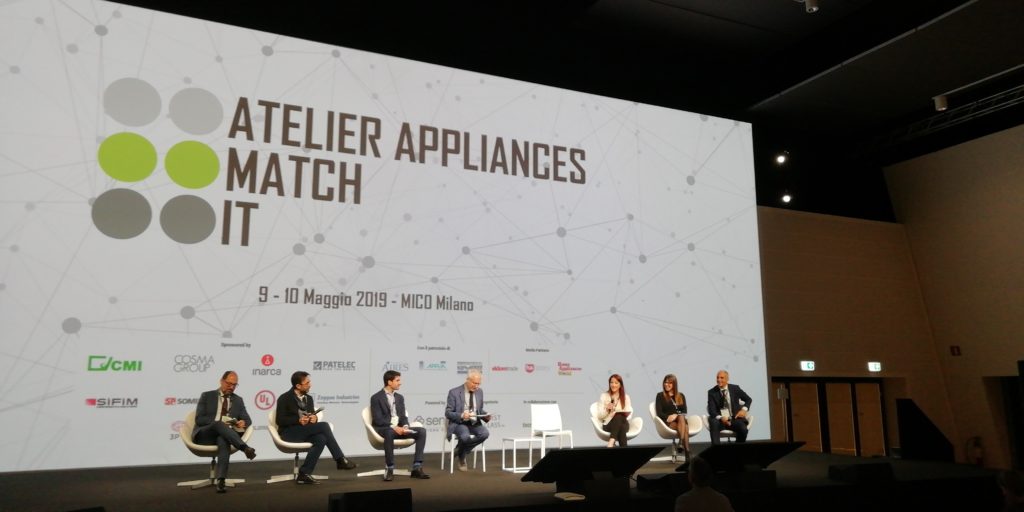Today, it is more important than ever for companies to create the conditions to make system. For this reason was born “Atelier Appliances Match It”, the event dedicated to household appliance components that has offered an opportunity of business, dialogue and thorough analysis.
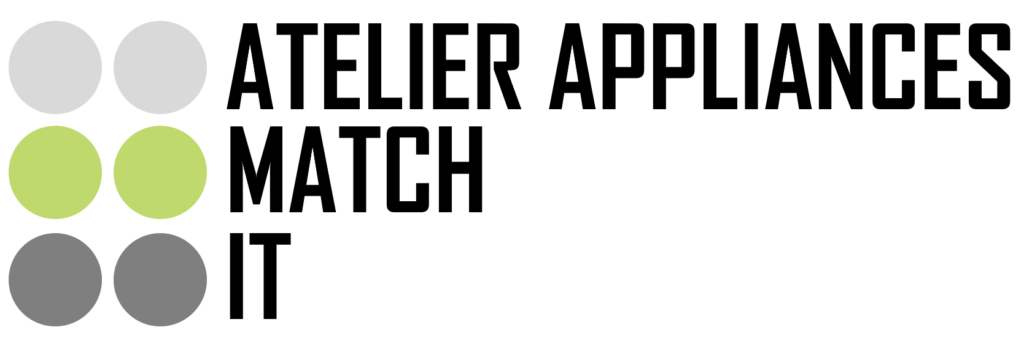 “Atelier Appliances Match It” was mainly an opportunity of relationship and business, last May attended for two days, at MiCo in Milan, by the world of component and household appliance manufacturers. Organized by Senaf, the event saw the participation of ten sponsors (3P Engineering, CMI, Cosma, Elemaster, Inarca, Patelec, Sifim, Somipress, UL, Zoppas Industries), taking part with their own stand, and proposed various networking possibilities and a rich programme of roundtables and conventions on topical themes.
“Atelier Appliances Match It” was mainly an opportunity of relationship and business, last May attended for two days, at MiCo in Milan, by the world of component and household appliance manufacturers. Organized by Senaf, the event saw the participation of ten sponsors (3P Engineering, CMI, Cosma, Elemaster, Inarca, Patelec, Sifim, Somipress, UL, Zoppas Industries), taking part with their own stand, and proposed various networking possibilities and a rich programme of roundtables and conventions on topical themes.
Ivo Nardella, president of Tecniche Nuove Group, and Massimo Moscati, editorial director of the appliance area of Tecniche Nuove, introduced the initiative, highlighting its uniqueness and the importance of matching.
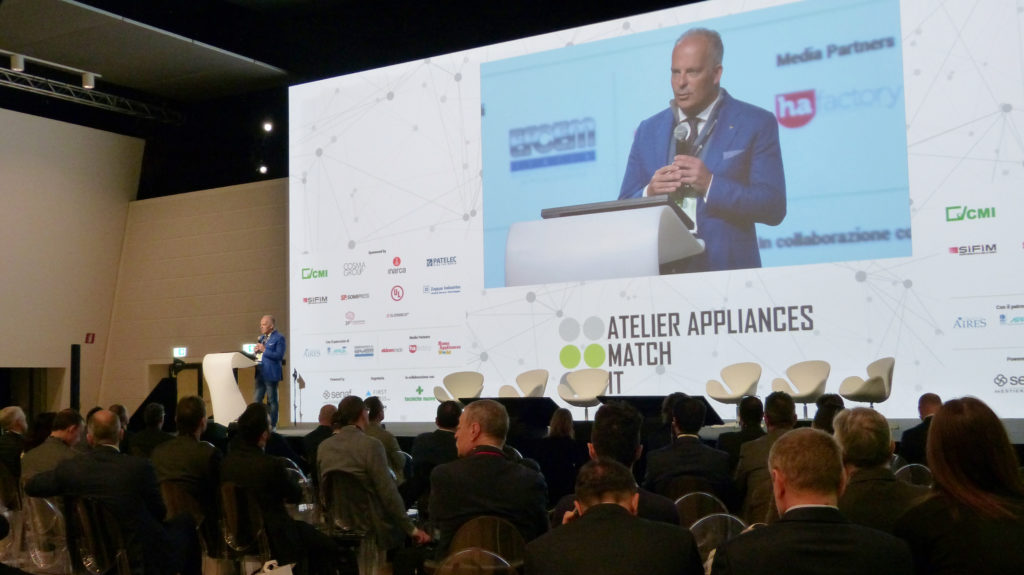
The challenges of the component ambit
The proceedings of the two-day event were started by Antonio Noto, from Noto Sondaggi polling institute, who presented the survey “Subcontracting and components. Investigation on sector companies “. Among the results, it is worth highlighting that 41% of interviewees think the market situation for their company has improved in comparison with 2-3 years ago. Besides, the prospects for the future are quite positive: for the next triennium, 46% of the participants in the survey estimate a growth ranging from +5% to +25% for their enterprise. As foreseeable, then, the digitalization issue is exerting a strong impact on businesses but the lack of in-house competences is still a hindrance.

The component field must face new challenges, summarized in his speech by Carlo Alberto Carnevale Maffè, professor by SDA Bocconi School of Management. The first challenge is what he defined “software versus hardware”, that is to say the need of a strong “injection” of software and AI in a chain highly focused on physical products. The second is the servitization: Maffé underlined that the turnover is no longer a suitable indicator for measuring the performances of a company and it is necessary to transform the “sale” into “revenue”. The third challenge is co-engineering, while the fourth is sustainability because nowadays we can produce nothing without taking into account this aspect to which consumers pay utmost attention.
After professor Maffè, Hansgeorg Derks from Bora took the floor and illustrated how to implement a successful brand with a forefront product. The company has released the suction plan, innovation in which they have strongly believed despite the initial mistrust of the market. Derks stated it is possible to develop an idea and to create the demand for a product but always bearing in mind that such product must satisfy people’s real requirements. Bora directly addressed consumers, showing the suction plan in exhibitions and events to allow “seeing from close up” its validity.

Afterwards it was held a roundtable – chaired by Carlo Alberto Carnevale Maffè – whose protagonist was Davide Rossi, from Aires association, together with Stefano Sopranzetti from Sifim and Paolo Santini from CMI, both representatives of the component world. Among the treated matters, the importance of making system/lobbying and the data exchange, a new form of dialogue among the different chain players that nowadays has become an ecosystem. The collaboration between household appliance producers and component manufacturers is strictly consolidating, leading to the exchange of technical data already in design phase. There are then the information owned by the retail and the use data of household appliances: the roundtable highlighted the importance of sharing information to implement better and better products.
The smart home is in evolution
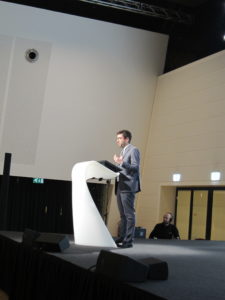
Giulio Salvadori, Director of the Observatory Internet of Things (Milan Polytechnics), showed that in 2018 the smart home market grew by 52% in Italy versus the previous year, reaching 380 million Euros: household appliances represent the 14% share (55 million Euros). Salvadori pointed out it is necessary to make consumers understand even better the benefit of smart functions and to develop the services connected with the smart home. AI, finally, is another trend at which we should work because it opens new possibilities. Among the most active companies of the Digital Innovation there is Samsung: Davide Bigoni presented the company’s contribution in the ambit of the smart home and IoT. The brand has already implemented a broad range of smart appliances and it aims at having 100% of connected products within 2020. Samsung has adopted an open approach, with the goal of favouring the interoperability of systems. Moreover, Bigoni underlined the company is currently focusing on AI, IoT, 5G and on safety. Bticino as well ranks among the pioneers of the smart home. In his speech, Davide Ceppi showed the main features of Living Now, a switch with an expanded surface that becomes an interface able to manage smart functions (control of lights and shutters, energy management). The interaction occurs through conventional controls, vocal or smartphone, with a simple immediate app.
Enrico Tardocchi from Europ Assistance explained instead the shift “from Smart Home to Smart Care”. The insurance company operates also in the Home&Family ambit with a network of business partners and assistance centres. The ecosystem of products and services designed by Europ Assistance is based on 3 key points: 24/7 support, customization and flexibility of the offer models. IoT assistance services focus on 3 areas (People, Possession, Problems) and, among the available products, Tardocchi highlighted MyClinic (the digital solution for the access to Health Services at home or while travelling) and Safe Digital (product intended for digital identity thefts).
Finally, Evaldo Porro from EFCEM Italia dealt with the issue of IoT in professional appliances. The connectivity in this ambit is a great opportunity because it allows decreasing costs and increasing the process efficiency, assuring higher quality. Connectivity means, for instance, constant control of appliances’ performances, easier fleet management and new maintenance possibilities.
The section dedicated to the smart home ended with a round table attended by Patrizia Campi (UL), Michele Peterle (Zoppas Industries) and Rosalino Usci (3P Engineering), chaired by Giulio Salvadori. Among the debated themes, data security: they particularly highlighted the importance of considering cyber-security and data protection since the design phase. Other treated subjects were the possibility of developing new business models thanks to IoT, the collaboration of start-ups and the central role played by digital competences.
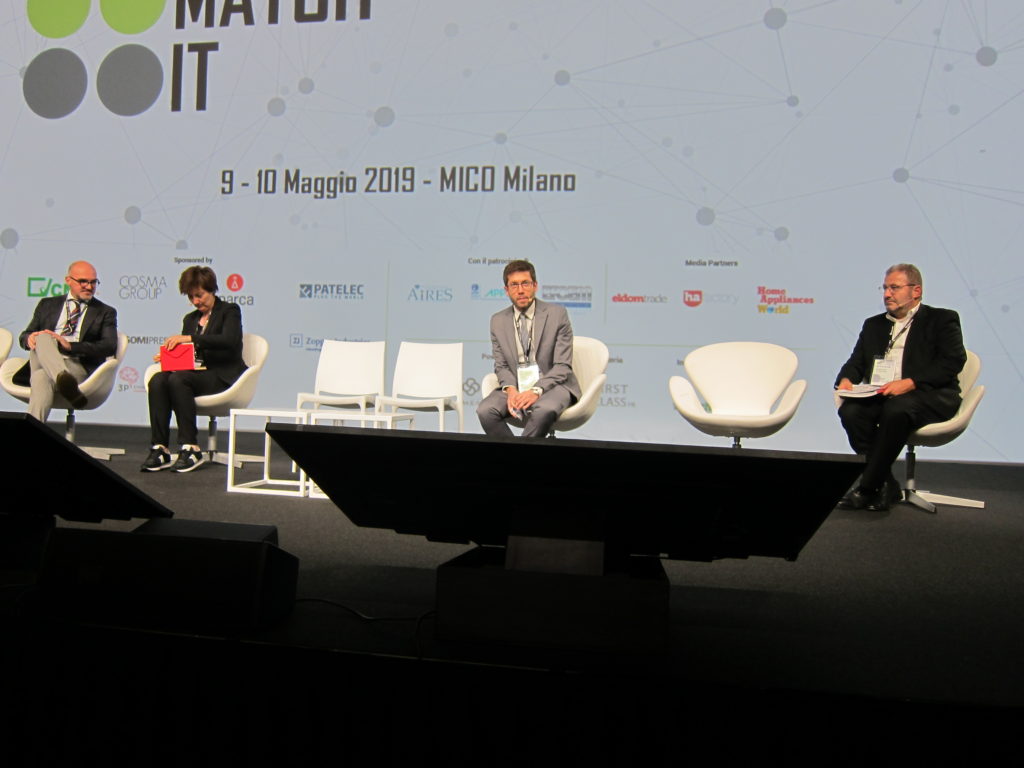
The contribution of design to the circular economy
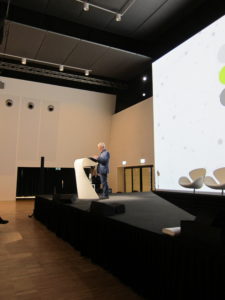
Francesco Zurlo, professor of Milan Polytechnics, underlined that in the digitalization era the design’s task does not consist only in designing fine and functional objects but it plays a more and more important role inside companies, also in view of the circular economy. Zurlo mentioned some design trends, like the Design for Disassembling (you design by thinking of the product life end since the beginning), Design for Durability (i.e. extending the duration of products in time enhancing their emotional appeal) and the Design for Service, where you design the access to a service and not the possession of an item. Paolo Tamborrini from Turin Polytechnics then pointed out how, to meet the sustainability requirement and to design new products indeed, the Eco-design is no longer sufficient but we need approaches and methodologies that work on complexity. The professor explained the Systemic Design operates starting from an in-depth study and mapping of the context where one works and the current possibility of collecting and crossing information is strategic for the success of new designs. According to this vision, we can for instance think of objects that can be connected with flows of material and energy. After Paolo Tamborrini took the floor Monica Rossi (Milan Polytechnics) and talked about the Life Cycle Thinking, that is to say the role of design with regard to the life cycle of a product. The speaker underlined workplaces and homes are smarter and smarter environments, however subjected to the time variable. How long does technology last, then? It is necessary to ponder it since the design phase, in order to extend objects’ life. Monica Rossi mentioned the Design for Maintenance/Reconfigurability enabling to conserve the value of an object in time. Moreover, she treated the Design for Upgrading (i.e. thinking how an item will host technology also in the future, to be always up-to-date) and Design for Disassembling/Recycling (through which the product value changes by reusing components and materials).
Marco Imparato from APPLiA Italia illustrated instead how the household appliance industry has always been “circular”: the results in products’ efficiency and reduction of manufacturing processes’ impact prove it. Concerning the circular flow of materials, Imparato highlighted the importance of correctly disposing Weee and of intercepting informal and illegal flows. Regarding then the recovery theme, in the opinion of APPLiA it is a feasible way, provided that the safety of regenerated products is assured. Finally, Imparato stated the circular economy can work only if all players are involved, as a systemic solution is necessary.
The event ended with a last roundtable, chaired by Francesco Zurlo, attended by Maria José Monteagudo Arrebola (UL), Giacarlo Locatelli (Cosma) and Giovanni Cogliati (Elemaster), besides Monica Rossi, Paolo Tamborrini and Marco Imparato. Each participant illustrated the experience of his reality in the circular economy: from the solutions to assess the circularity of a company to the investments in energy saving, material recycling and finally co-design activities to enable the upgrading of a component in a product.
